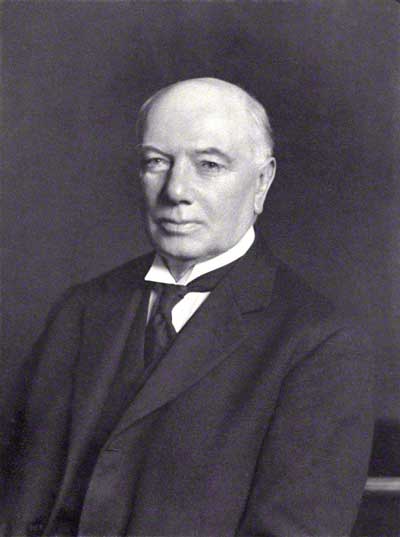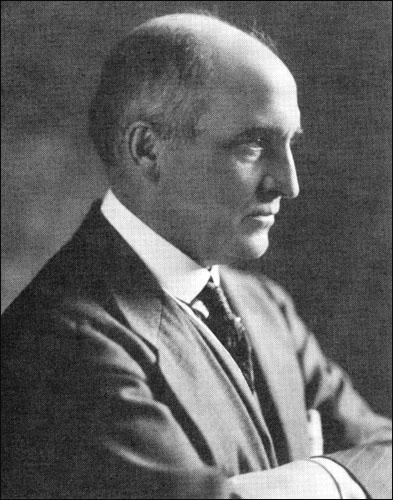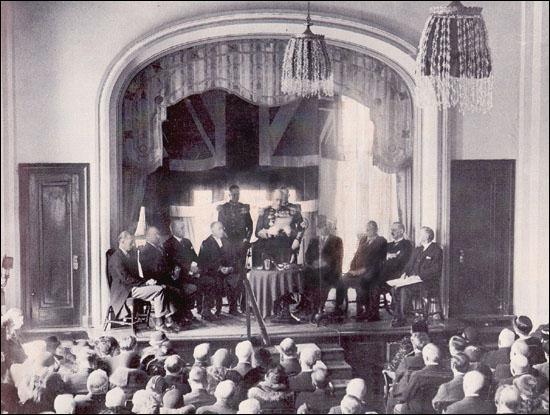The Newfoundland Royal Commission, 1933 (The Amulree Commission)
In November 1932, in the depths of the Great Depression, the Newfoundland government led by F.C. Alderdice let it be known that there would be a partial default on payments on the public debt, which then stood at approximately $100 million. The British and Canadian governments were alarmed, fearing a negative impact on the already fragile stock markets, and thus on the credit of Canada and other British dominions. It was therefore agreed that in the short term, Canada and Britain would help Newfoundland meet the full debt payments, pending the report of a royal commission of inquiry.
The British government appointed the chairman, Lord Amulree. The Canadian government appointed C.A. Magrath, and the Newfoundland government Sir William Stavert. Both Magrath and Stavert were Canadian bankers. The commissioners were assisted by an official from the Dominions Office who was to have a long association with Newfoundland, P.A. Clutterbuck.

Discussing the Newfoundland Government System
The commission held closed hearings in Newfoundland, starting in St. John's and travelling across the island on the railway. The members then went on to Ottawa to meet members of the Canadian government. It was made very clear to the commissioners that many Newfoundlanders had lost faith in responsible government as a system, and in their political leaders. They wanted help, and they wanted a change: but they did not want confederation, and neither did the Canadian prime minister, R.B. Bennett.

Officials in London had been discussing the Newfoundland crisis while the royal commission was on the other side of the Atlantic. When Amulree returned, he found that these discussions had produced a plan which he was expected to recommend. Newfoundland's public debt would be rescheduled at a lower rate of interest, and guaranteed by the British government. This would prevent default, reassure bondholders, and prevent panic in the markets. But financial intervention and assistance of this type were incompatible with responsible government. Thus Newfoundland would have to agree to give up that system of government temporarily, and allow Britain to administer the country through an appointed commission.
The Amulree Report
This became the central recommendation of the Newfoundland Royal Commission, whose report was published in October 1933. It was justified by the argument that the predicament in which Newfoundland found itself was the result of mismanagement, inefficiency, corruption and financial irresponsibility. Thus the country needed to be given "a rest from politics", and a period of stability, rehabilitation and reconstruction under the control of Great Britain. Direct rule would end once Newfoundland was again "self-supporting".
The report was well-received by the press and most members of the public. It was debated by the legislature in November, which passed an address to the Crown asking for the suspension of the constitution. In February 1934 the Commission of Government took office.

Criticisms
For all the praise that the Amulree Report initially received, there were some people in 1933 who voiced serious reservations, and there have been many more since. The report's criticisms of Newfoundland politicians and the political system have been seen as unfair and exaggerated, for instance, and its refusal to consider default a serious option as short-sighted. There was far too little weight given to the impact of the First World War and the Depression on the country's economy and finances, and, arguably, the spending record of successive governments was misrepresented.
Most modern scholars would endorse these and other criticisms, and agree that Amulree's diagnosis was erroneous and his historical analysis flawed. They would probably point out, however, that the report has some astute and valuable things to say - on the Newfoundland economy, for instance - and that it is still very much worth reading. It is one of the most important documents in Newfoundland and Labrador history, marking the end of 79 years of responsible government, the start of a 15-year political hiatus, and, some might argue, the beginning of the road to confederation.




